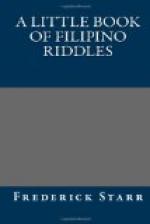Title: A Little Book of Filipino Riddles
Author: Various
Release Date: December 15, 2004 [EBook #14358]
Language: English
Character set encoding: ASCII
*** Start of this project gutenberg EBOOK A little book of Filipino riddles ***
Produced by Jeroen Hellingman and the PG Distributed
Proofreaders
Team, from scans kindly made available by the University
of Michigan.
Philippine Studies
I
A Little Book of Filipino Riddles
Collected and
Edited
by
Frederick Starr
World Book
Co.
Yonkers, New York
1909
Copyrighted 1909 by
Frederick Starr
The Torch Press Cedar Rapids, Iowa
This Little Book
of
Filipino Riddles
Is Dedicated To
Gelacio Caburian
Casimiro Verceles
Rufino Dungan
of
Agoo, Union Province
INTRODUCTION
Although I had already inquired for them from Ilocano boys, my first actual knowledge of Filipino riddles was due to Mr. George T. Shoens, American teacher among the Bisayans. He had made a collection of some fifty Bisayan riddles and presented a brief paper regarding them at the Anthropological Conference held at Baguio, under my direction, on May 12-14, 1908. My own collection was begun among Ilocano of Union Province from whom about two hundred examples were secured. Others were later secured from Pangasinan, Gaddang, Pampangan, Bisayan and Tagal sources. My informants have chiefly been school-boys, who spoke a little English; they wrote the text of riddle and answer in their native tongue and then we went over them carefully together to make an English translation and to get at the meaning. Many Filipinos know how to read and write their native language, although few have had actual instruction in doing so. There is no question that errors and inconsistencies exist in the spelling of these riddles, due to this lack of instruction and to the fact that the texts have been written by many different persons. I am myself not acquainted with any Malay language. I have tried to secure uniformity in spelling within the limits of each language but have no doubt overlooked many inconsistencies. The indulgence of competent critics is asked. It has been our intention throughout to adhere to the old orthography. Thus the initial qu and the final ao have been preferred.
The word for riddle varies with the population. In Ilocano it is burburtia, in Pangasinan boniqueo, in Tagal bugtong, in Gaddang ——, in Pampangan bugtong, in Bisayan tugmahanon.




